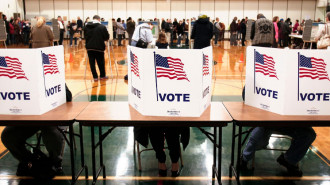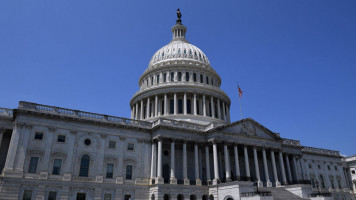Iran rocked by rare anti-government protests
Fresh protests erupted in Iran on Friday with demonstrators frustrated over its struggling economy and alleged corruption marching on Tehran and other major cities.
Thousands have taken to the streets in anti-government rallies, in what is thought to be the biggest show of public defiance since 2009.
The protests come a day after demonstrations against rising food prices and inflation began in second city Mashhad, with authorities arresting 52 protesters over the unrest.
Now, it seems the topics of anger have turned to Iran's involvement in costly wars in the region including Syria and Iraq and the slow economic growth under President Hassan Rouhani, despite the lifting of international sanctions following the landmark 2015 nuclear deal.
Police dispersed anti-government demonstrators in the western city of Kermanshah as protests spread to Tehran, the semi-official news agency Fars said. An official said a few protesters had been arrested in the capital.
Footage posted on social media showed a heavy police presence as people chanted "Death to Rouhani". Some footage, which could not be authenticated, showed a water cannon and tear gas being used against protesters.
Twitter Post
|
Others shouted "not Gaza, not Lebanon, my life for Iran" reflecting anger that the government is focusing too much on regional politics rather than tackling domestic problems.
There were also chants of "We don't want an Islamic Republic" as the unrest coincided with the easing of Islamic dress codes imposed on women in 1979 - seemingly an attempt to diffuse tensions.
Openly political protests are rare in Iran, where security forces have a heavy presence. The last unrest of national significance occurred in 2009 when Mahmoud Ahmadinejad’s re-election as president ignited eight months of street protests. Pro-reform rivals said the vote was rigged.
The US State Department has expressed its support for the protests and condemned the arrest of peaceful demonstrators.
A strongly-worded statement on Friday said: "Iran's leaders have turned a wealthy country with a rich history and culture into an economically depleted rogue state whose chief exports are violence, bloodshed and chaos."
It added: "As President Trump has said, the longest-suffering victims of Iran's leaders are Iran's own people."
"We urge all nations to publicly support the Iranian people and their demands for basic rights and an end to corruption."
Twitter Post
|

![Palestinians mourned the victims of an Israeli strike on Deir al-Balah [Getty]](/sites/default/files/styles/image_684x385/public/2024-11/GettyImages-2182362043.jpg?h=199d8c1f&itok=xSHZFbmc)


![The law could be enforced against teachers without prior notice [Getty]](/sites/default/files/styles/image_684x385/public/2178740715.jpeg?h=a5f2f23a&itok=hnqrCS4x)
 Follow the Middle East's top stories in English at The New Arab on Google News
Follow the Middle East's top stories in English at The New Arab on Google News


